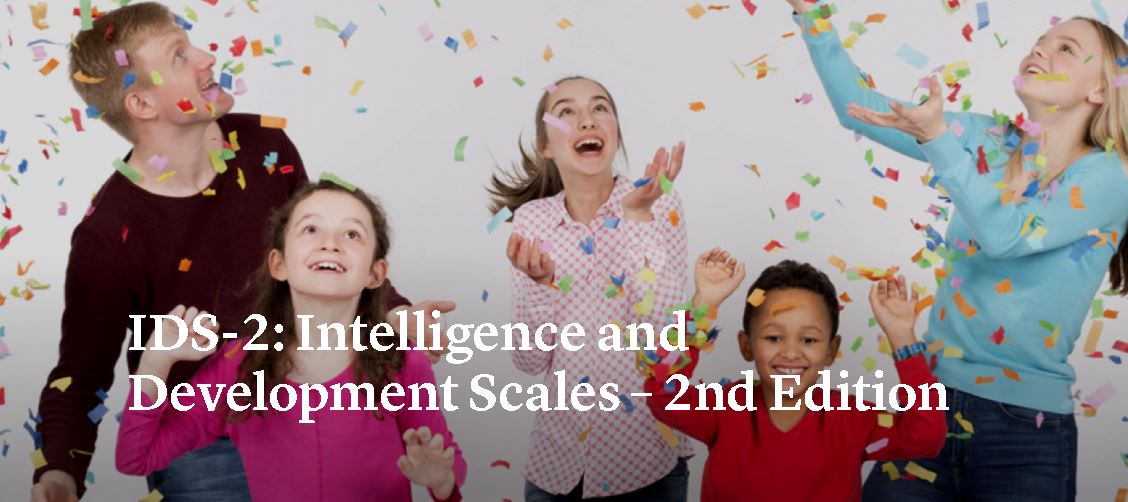Intelligence and Development Scales - 2nd Edition (IDS-2)
Author(s) : Alexander Grob & Priska Hagmann-von Arx
Publisher : Hogrefe, 2021
SKU : PG_IDS2


Purpose: Evaluate the ‘whole child’ by looking at Intelligence, Executive Functions, and General Development
Age: 5.0-20.11 years
Time: Intelligence: IQ screening (10 minutes); IQ general (50 minutes); IQ complete profile (90 minutes); Executive Functions (30 minutes); Psychomotor Skills (20 minutes); Social-emotional Skills (15 minutes); Basic Skills (according to age 30-60 minutes); Motivation and Attitude (7 minutes).
The Intelligence and Development Scaled–2nd Edition (IDS-2) provides in-depth information on the child’s strengths and developmental needs, enabling testers to identify with precision where support is needed to help them achieve their full potential.
The IDS-2 offers the most comprehensive diagnostic assessment available, with 30 subtests covering the six domains: two cognitive domains (Intelligence and Executive Functions) and four developmental domains (Psychomotor skills, Social-emotional skills, Scholastic skills, and Motivation and Attitude).
Developed in a unique modular framework with child-friendly test materials, the IDS-2’s flexible design makes it easy to personalize the testing session. Booklets and record sheets are colour-coded for ease of use and scoring is conducted online for convenience and accuracy.
The IDS-2 can be used across a variety of diverse applications, including identifying and diagnosing intellectual disabilities and learning disorders, evaluating cognitive and motor skills, understanding emotional strengths and weaknesses.
The IDS-2 is valuable in the education sector to determine aptitude, assist with school enrolment or transition between primary and secondary, providing meaningful results to pinpoint specific actions and interventions.
With the IDS-2, users will benefit from:
- a wider age range (extended to down to age 5;0 and up to 20;11)
- a complete battery that assesses both intelligence and development (across 6 modular domains and 30 subtests)
- coverage of every area of the CHC model of intelligence, instead of selected areas
- more options for intelligence testing for greater flexibility – the IDS-2 provides general intelligence testing, an in-depth IQ profile, and quick IQ screening
- smooth administration with a frustration-minimizing inversion rule, rather than a classical inversion rule
- norms developed through state-of-the-art continuous norming, so users need not rely on small sub-samples for each age group
- online scoring included with each purchase of the record forms
Intelligence
Including IQ-Screening (2 tests), general intelligence (7 tests), and a complete IQ-Profile (14 tests).
The IDS-2 approach to intelligence uses the Cattell-Horn-Carroll theory. Covering verbal and abstract thinking, short and long-memory, and visual processing and processing speed, scores can be calculated using two, seven or fourteen subtests.
Executive Functions
Including inhibition, working memory, and cognitive flexibility.
The Executive Functions measured on the IDS-2 are regulation and control processes that enable goal-oriented and situational action.
Psychomotor Skills
Psychomotor Skills on the IDS-2 encompasses control and function processes, as well as sensory, perceptive, cognitive and motivational processes that are the basis for posture and movement.
Social-Emotional skills
Social-emotional Skills measured on the IDS-2 include both identifying and regulating emotions as well as social competence.
Basic/Scholastic Skills
Including mathematical reasoning, reading and spelling.
Specific to each country’s school curriculum, Basic Skills in linguistic acquisition, reading, spelling, and logical mathematical reasoning are measured.
Motivation and Attitude (for ages 11 to 20 years)
Unique to an intelligence battery, the IDS-2 provides an assessment of conscientiousness and performance motivations of 11- to 20-year old children and adolescents.
Modular Administation
The IDS-2 has a modular design so that each assessment session covers the areas needed in an individual way. Testing times (approximate) are:
- Intelligence: IQ screening (10 minutes); IQ general (50 minutes); IQ complete profile (90 minutes).
- Executive Functions (30 minutes).
- Psychomotor Skills (20 minutes).
- Social-emotional Skills (15 minutes).
- Basic Skills (according to age 30-60 minutes).
- Motivation and Attitude (7 minutes).
Online Scoring
The IDS-2 is scored using the state-of-the-art continuous norming process via the online Hogrefe Test System 5 (HTS 5). Scoring is free of charge (pricing is included with the printed test protocol) and no annual HTS license is required.
Continuous Norming allows for more precise calculations. The IDS-2 provides standardization data at one-month intervals, making printed booklets impossibly large. Hogrefe’s innovative NormViewer technology in HTS 5 provides access to the calculated tables with just a few clicks.
Reliability and Validity
Information on internal consistency and test-retest reliability is available on all languages. Studies are available on construct validity with various assessments (e.g. IDS, WIS-IV), on criterion validity (e.g. with school performance) and on differential validity (e.g. ADHD, autism spectrum disorder, intelligence impairment, exceptional talent) depending on the language.
- IDS-2 Intelligence: IQ Screening Sample Report (online Form B)
- IDS-2 Intelligence Sample Report (online Form A)
- IDS-2 Executive Functions Sample Report (online Form C)
- IDS-2 General Development Domains (5-6 years) Sample Report (online Form D)
- IDS-2 General Development Domains (7-10 years) Sample Report (online Form E)
- IDS-2 General Development Domains (11-20 years) Sample Report (online Form F)
The following qualifications are required to access this product. Please
login or register to proceed
Please contact ACER Customer Service on +61 3 9007 2048 if you have any queries.
Psychologist (P)
- A registered psychologist with AHPRA registration number
- Please Note: If purchasing ADOS-2 materials, it is recommended that registered psychologists complete ADOS-2 Training.
Provisional Psychologist (PS)
A provisional psychologist with:
- Supervisor’s APHRA registration number
- Letter outlining supervisory arrangements
- APHRA registration number














